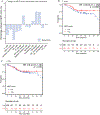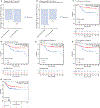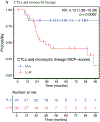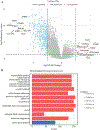Novel Computational Analysis Identifies Cytotoxic Lymphocyte-to-Monocyte Balance in Tumors as a Predictor of Recurrence-Free Survival in Colorectal Carcinoma
- PMID: 40544207
- PMCID: PMC12260141
- DOI: 10.1245/s10434-025-17599-w
Novel Computational Analysis Identifies Cytotoxic Lymphocyte-to-Monocyte Balance in Tumors as a Predictor of Recurrence-Free Survival in Colorectal Carcinoma
Abstract
The microenvironment and immune infiltrate population of colorectal tumors can serve as a stronger predictor of patient survival than microsatellite-status or traditional T- or N-staging. This study aimed to leverage transcriptomic techniques to identify specific immune cell populations and their ratios associated with cancer recurrence in colorectal cancer patients. The goal was to identify patients who could benefit from early adjuvant interventions, identify those at higher risk of recurrence for surveillance, and identify potential combinatorial immunotherapy strategies tailored to this disease. We found that a lower ratio of cytotoxic lymphocyte: monocytic lineage cells, and not microsatellite-status, was associated with cancer recurrence. Additional differential gene expression analysis of the monocytic lineage demonstrated that genes specifically associated with tumor associated macrophages and a protumoral phenotype were overexpressed in the tumor microenvironment in patients that went on to have recurrent disease. Gene Ontology analysis revealed that pathways associated with pro-tumoral extracellular matrix remodeling were suppressed in tumors exhibiting a high cytotoxic lymphocyte: monocytic lineage ratio, suggesting a diminished propensity for tumor progression. The development of these prognostic markers not only associates with colorectal cancer recurrence, aiding in risk stratification and guiding adjuvant therapy decisions for resected early-stage patients, but also suggests that effective colon cancer treatments will likely require a combination of cytotoxic T-cell-directed immunomodulation and targeted inhibition of tumor-associated macrophages.
© 2025. Society of Surgical Oncology.
Conflict of interest statement
Disclosure: There is no competing financial interests in relation to the work described. Bridget Keenan. Consulting Fees: Regeneron. Research funds (to university): Partner Therapeutics, Apexigen/Pyxis Oncology, Antengene, Innovative Cellular Therapeutics, Wugen, AstraZeneca, Takeda, Roche/Genentech, Regeneron. Travel Expenses: Roche/Genentech. Advisory Board: Cartography
Figures





References
-
- Edwards BK, Ward E, Kohler BA, Eheman C, Zauber AG, Anderson RN, et al. Annual report to the nation on the status of cancer, 1975–2006, featuring colorectal cancer trends and impact of interventions (risk factors, screening, and treatment) to reduce future rates. Cancer. 2010;116(3):544–73. - PMC - PubMed
-
- Chung KY, Gore I, Fong L, Venook A, Beck SB, Dorazio P, et al. Phase II study of the anti-cytotoxic T-lymphocyte-associated antigen 4 monoclonal antibody, tremelimumab, in patients with refractory metastatic colorectal cancer. J Clin Oncol. 2010;28(21):3485–90. - PubMed
MeSH terms
Substances
Grants and funding
LinkOut - more resources
Full Text Sources
Medical

